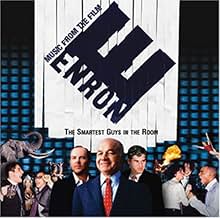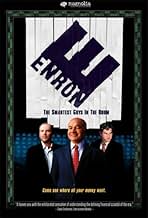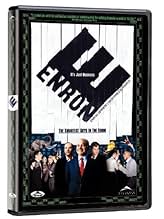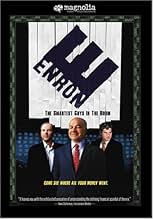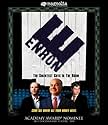Enron: The Smartest Guys in the Room
- Episode aired Oct 13, 2005
- R
- 1h 49m
Corporate audio and videotapes tell the inside story of the scandal involving one company's manipulation of California's energy supply and its, and how its executives wrung a billion dollars... Read allCorporate audio and videotapes tell the inside story of the scandal involving one company's manipulation of California's energy supply and its, and how its executives wrung a billion dollars out of the resulting crisis.Corporate audio and videotapes tell the inside story of the scandal involving one company's manipulation of California's energy supply and its, and how its executives wrung a billion dollars out of the resulting crisis.
- Director
- Writers
- Stars
- Self
- (archive footage)
- Self
- (as Jim Chanos)
- Self
- (archive footage)
- Self - Young man the stripper dances in front of
- (as Reggie Deets II)
- Director
- Writers
- All cast & crew
- Production, box office & more at IMDbPro
Featured reviews
Energetic Hubris.
Alex Gibney's absorbing documentary, based on the book co-authored by the first prominent whistle blower and Enron executive, Bethany McLean, begins with the tragic concept of the pervasive fatal flaw, hubris, and applies it meticulously to the tragic figures Ken Lay, Andrew Skilling, and Andrew Fastow. Tragic in the sense that those talented executives allowed the company to fall while they lined their pockets with the assets of its 20, 000 employees, countless investors, and the state of California, which suffered mammoth losses due to its new energy deregulation and manipulation of that energy by Enron.
The documentary succeeds in explaining the crimes while lacing the story with just enough drama to make suspenseful the outcome we all know before we view the film: Fastow is doing time, Lay and Skilling await trial, former employees work past their retirement ages because their pensions have been gobbled up by the crimes, and California now regulates its energy but still suffers from massive deficit.
The documentary fails when it manipulates its audience with background songs that dramatize the obvious ironies, e.g.' "Son of a Preacher Man" plays during Lay's biography. Such skewering is almost impossible to avoid once a documentarian picks up a camera and selects the images; what he doesn't have to do is underscore the ironyThe players will do it all on their own. It also seems to hold back on the cozy relationship between Lay and the Bush family. Perhaps another time.
Meanwhile, this documentary is compelling viewing of a tragedy about a company, as one of the talking heads describes, that was "a house of cards . . . built over a pool of gasoline." It is enjoyable to see it figuratively torched like the House of Wax.
In the dictionary next to "hubris"....
Yes, it is a movie with a point of view, but this is not a Michael Moore documentary. Director Alex Gibney brilliantly tells the story simply by interviewing people who were participants in the events, showing the time lines of those events, and interweaving an astonishing amount of video and audio footage taped at Enron, by Enron itself. The movie resolved for me the question: "What did they know, and when did they know it?" They knew. They not only knew; they designed the company to be the ultimate shell game, with no pea. The only thing Enron ever had to sell was its stock price. And they did know that was their only product.
As a Houstonian, I admit that I, a supposedly sophisticated business professional, was intimidated by Enron's assertion in its glory days that the reason I didn't understand its business was just that I wasn't smart enough. My friends, managers and lawyers, some from Harvard thenselves, also admit to the same intimidation. It was not that the questions were not being asked; it was just that we were silenced when Enron avowed that they were the smartest guys in the room. They asserted it, and we believed them. Thank good Fortune that one reporter, Bethany McLean, in almost too soft a voice to be credible as a giant killer, kept asking.
I wish this movie might inspire a larger remedy than the one being attempted by the Department of Justice. Why doesn't Harvard deny admission to people like Jeff Skilling, who, when questioned in his entrance interview whether he was smart, replied, "I'm (expletive deleted) smart"? Why isn't some humility and modesty still ranked a virtue? Why do we celebrate the rise of the specialist educated only in his field, and wholly ignorant of the inevitability of the fall of the Greek protagonist who becomes blinded by arrogance, power, greed---- in short, hubris? Why is ethics a specialty study, instead of integral to every field of study? I sat open-mouthed as the tape showed Jeff Skilling seriously selling a new business idea: selling futures in the weather. He parodied himself on tape: he had a new, better idea than the "mark to market" booking which allowed Enron to book future theoretical profits once they had signed a deal; now he would institute "hypothetical to book", booking profits as soon as he had an idea. What, ultimately, was the difference between the parody and the reality? The horror of listening to traders, who sat in a room directly below Ken Lay and Jeff Skilling, with staircases between their executive offices and the trading floor, laughing at the misery they were inflicting on California as they extorted profits from that misery, leaves me outraged long after the movie is over. They threatened and may have cost lives with their fraudulent tactics. They admit it on tape, laughing. They knew. It was their business plan. To make Andrew Fastow the scapegoat for what Enron was developing as its business plan before he was ever hired is simply the continuation of the shell game with no pea. Look for the "designated fall guy". They still think they are the smartest guys in the room.
No, I'll never be selected for the jury pool now, but I wouldn't have been anyway. I'll buy the DVD and watch it a few times during the trials and seethe, lest I forget. Excellent movie, the best kind of documentary.
Very very interesting... must see.
Thankfully, I was quite wrong. I found the film to be both factual and evenhanded, and it's portrayal of the key Enron players provided depth, character, and even compassion at times.
There's no doubt that Enron was the defining business fiasco of the last 20 years, but what struck me about this films presentation (and which was wholly lost in most of the media coverage) is that its downfall was not entirely driven by greed. At least, not at the highest levels of the firm.
The primary contributing factor to the disaster was, in fact, ego. These guys didn't wake up in the morning looking to rip off their employees and shareholders and tank the company. They had (what they thought was) a revolutionary idea on how to sell energy in the marketplace. As far as they could tell, it was dynamite on paper, and they had their egos so wrapped up in these ideas, that they became completely blind to the reality that they were hemorrhaging capital because it simply didn't work in reality. It got to the point that in order to conceal their intellectual failure, they embarked on ever-more radical measures to hide the firms losses. Mind you, they all seemed to genuinely believe that eventually these new ideas would begin to work, and they would recoup all the losses and then some. At times, it seemed to resemble the attitude of a gambler who can't get up from the card game because he's waiting for that one perfect hand that never comes, and loses the house and car in the process. It's not what he intended when he sat down, but its the result nonetheless.
Of course, Enron was cheered on by the irrational exuberance of the late-90's boom market, which only served to enable this attitude, and in fact attracted a lot of genuinely greedy and sleazy traders, brokers and banker who were eager to make a buck off of the Enron business model.
Which leads me to the one disappointment that I have with this film, which is that it omits entirely the role that the Clinton Administration played in fostering the irrationally exuberant Wall Street culture of the era. If Ken Lay and Jeff Skilling were the degenerate gamblers, Bill Clinton was the enabling wife who never put her foot down and demanded he get help or get out. (The film, does, however detail the business dealings that Enron had with the Bush family... they should have either left politics out, or been more evenhanded in this regard.) What is remarkable, however, is the relatively short amount of time this all occurred in. Enron went from modest pipeline company, to energy juggernaut to total bust in, what, 5-6 years? Amazing.
Some will walk away from the Enron story convinced that the system will never work. I, however, see it differently. To me, the system worked. If it has proved anything, it's that no matter how rich, powerful or influential you are, you simply can't cook the books for very long in a free market environment before everything comes crashing down around you in a big way. The Enron story should make powerful executives think twice when tempted to do something unethical, regardless of intention. Which really should be a comforting thought for everyone.
See this film. It's definitely worth the time.
This movie is a must-see
'Twas hubris killed the beast
The Enron scandal was a tough one to understand, at least to me it was, because you could never quite figure out what Enron did. And director Alex Gibney breaks it all down matter-of-factly, never taking sides, never being judgmental, to show us what happened. Of course, he really doesn't need to be judgmental because the actions of Lay, Skilling and Fastow (and a few others) speak volumes.
Gibney's film very well could have been a convoluted mess. But he never loses sight of the fact that this is essentially a story about people. Not only the masters of the universe whose hubris eventually brought them down but, more importantly, the people whose livelihoods depended on what Lay, Fastow and Skilling did and who, unlike those three, didn't have millions to fall back on.
It's impossible not to feel incensed by what they did. Lay, Fastow and Skilling destroyed countless lives, yet they left with millions. There's a moment when Lay bemoans that his net worth dipped from $20 million to, I believe, $6 million. Yeah, tell that to the Oregonian utility worker, whose $340,000 nest egg was eventually only worth $1,200 after Enron stock tumbled in the wake of the scandal.
What's ultimately devastating about this film is listening to the tapes of Enron traders joking about how they were holding California hostage and letting people there suffer without electricity. These chaps are cold, callous and exemplify the Enron environment.
This is a fascinating film because it exposes these guys for who they are. And after listening to those interviewed in this film, it's impossible to believe Lay and Skilling were somehow oblivious to it all. How else could you explain why they insisted Enron employees invest in the company stock while they themselves were cashing out?
What's equally infuriating is realizing how Wall Street sucked up to Enron and how investment firms turned on anyone who dared to question Enron's power.
Of course, it's not surprising at all to see Lay's connections to the Bush family. But I am certain Dubya really didn't know very well someone he called "Kenny Boy." Just as, I'm sure, W's photos with Jack Abramoff mean absolutely nothing, either.
There's a moment in "Wall Street" when Bud Fox asks Gordon, "How much is enough?" And Gordon replies, "It's not a question of enough, pal. It's a zero sum game, somebody wins, somebody loses. Money itself isn't lost or made, it's simply transferred from one perception to another."
That's exactly what Enron did under Lay and Skilling. Except they did it on the backs of tens of thousands of hard-working Americans who lost pretty much everything. I can only hope the American justice system does right by all those workers.
Did you know
- TriviaAmong the protesters who disrupt the meeting with Jeff Skilling at San Francisco's Commonwealth Club is Marla Ruzicka, who was killed on 16 April 2005 in Iraq by a suicide bomber. She founded CIVIC (Campaign for Innocent Victims of Conflict) which worked to help the victims of the war in Iraq and she was a former Global Exchange activist.
- Quotes
Gray Davis: [upon being asked whether the rumors that he was responsible for the black outs in California are just a plot by the Republican party to get him recalled]
[shouts]
Gray Davis: Hello!
- Crazy creditsSpecial thanks includes "all the `Deep Throats' - you know who you are!"
- ConnectionsFeatured in 2006 Independent Spirit Awards (2006)
Details
- Runtime
- 1h 49m(109 min)
- Color
- Sound mix
- Aspect ratio
- 1.85 : 1


